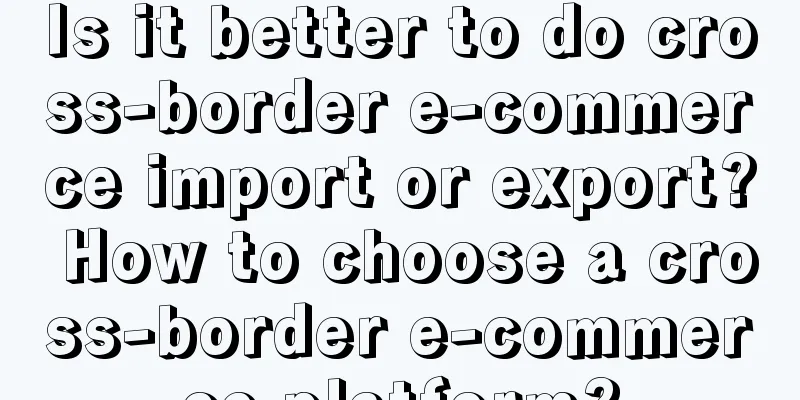Is it better to do cross-border e-commerce import or export? How to choose a cross-border e-commerce platform?

|
With the increasing integration of the global market and the rapid development of Internet technology, cross-border e-commerce has become an important way for many companies to expand into the international market. However, for companies, when choosing whether to conduct cross-border e-commerce imports or exports, they often face certain confusion. The following will explore the advantages and disadvantages of cross-border e-commerce imports and exports from several aspects. 1. Is it easier to do cross-border e-commerce import or export? Market demand: First, in terms of market demand, both cross-border e-commerce imports and exports have their own unique opportunities and challenges. Imports can meet the needs of domestic consumers for foreign goods, especially high-quality and affordable goods, which have great potential demand in the domestic market. Exports can promote domestic goods to overseas markets, take advantage of foreign consumers' pursuit of high-quality and unique products, and expand sales. Competitive pressure: Both cross-border e-commerce imports and exports face fierce competitive pressure. Imported goods need to compete with similar goods in the domestic market, including price, quality and service. Exports need to compete with other suppliers in the international market, including product features, brand influence and market penetration. Therefore, enterprises need to choose the appropriate cross-border e-commerce model based on their own strengths and resources. Capital investment and operating costs: From the perspective of capital investment and operating costs, both cross-border e-commerce import and export require certain capital investment and operating costs. Import may involve procurement, logistics, customs clearance and other links, and need to overcome currency risks and trade barriers. Export needs to consider product adaptability, target market understanding and promotion and other aspects. Enterprises need to comprehensively consider capital and cost factors and choose a cross-border e-commerce model that suits them. 2. How to choose a cross-border e-commerce platform? When choosing a cross-border e-commerce platform, companies need to pay attention to the following key factors: Platform visibility and influence: Choosing a cross-border e-commerce platform with a good reputation and high visibility can enhance the brand image and attract more attention from target consumers. Target market coverage: Different platforms have different coverage in different countries and regions. Enterprises need to choose a cross-border e-commerce platform that is suitable for the target market to obtain better market opportunities. Development potential and scale: Choosing a cross-border e-commerce platform with great development potential and a large number of users can provide broader sales channels and more sales opportunities. Service support and operation tools: Understanding the service support and operation tools provided by the platform, such as logistics distribution, payment settlement, data analysis, etc., is very important for the operation and management of the enterprise. Cost and fee structure: Consider the fee structure and cost of the platform, including platform usage fees, commission ratios, promotion costs, etc. Ensure that the company can obtain good cost control and profit margins on the selected platform. In short, cross-border e-commerce imports and exports have their own advantages and challenges. Which one is better to do depends on the seller's actual situation and market demand. At the same time, sellers also need to pay attention to the selection and rules of cross-border e-commerce platforms, continuously optimize their products and services, and improve consumers' shopping experience and satisfaction, so as to succeed in the fiercely competitive market. Recommended reading: Which platform should I choose for my personal cross-border e-commerce business? What are the requirements for entry? How much does it cost for personal cross-border e-commerce? Do I need a deposit? Can cross-border e-commerce personal trademarks be registered? What are the regulations? |
<<: What are the tips for optimizing Shopee titles? How to run a good store?
Recommend
Where is the entrance to Shopee live streaming? How to set it up?
There are many marketing promotion methods on the ...
What is Shouxin Easy Payment? What are its advantages?
Today, let's learn about Shouxinyi Payment, wh...
Targeting TikTok, can the three sheep replicate the domestic "myth"?
Three Sheep has officially entered the overseas li...
Chinese AI conquers foreigners and tops the list for many days
How did the "Clay AI" filter of Remini A...
Two types of advertisements in "Fanghua": the ones that were crossed out and the ones that were empathized with
This article analyzes the successful advertising p...
5 Ways to Optimize Your Advertising Campaigns in 2023
This article mainly proposes five ways to optimize...
What kind of brand collaboration is a marketing bomb?
What kind of brand collaboration can ignite market...
800,000 people watched Wahaha’s drastic changes and gave thousands of opinions!
How did Wahaha, which suddenly gained nationwide a...
10 essential models for Xiaohongshu in 2023
The latest data shows that Xiaohongshu currently h...
Where can I see the click-through rate of Amazon ads? How can I improve it?
Everyone is familiar with Amazon. Many people have...
How to quickly promote a product on Xiaohongshu! How to achieve 20 million+ sales through Xiaohongshu in less than a year?
Want to know how brands can successfully find a se...
Taking advantage of "Fengshen", whose gameplay is more "toxic" among Alipay, Shuyi and Zhihu?
The popularity of the movie "Investiture of t...
What are the funding needs of cross-border e-commerce?
Whether you are doing domestic e-commerce or cross...
What should I do if I don't have turnover when opening a personal store on Shopee? What are the requirements for turnover?
Many individuals open stores on the Shopee platfor...
How to register for Amazon's Plan 0? Is Plan 0 useful?
Amazon merchants, especially those with good sales...









